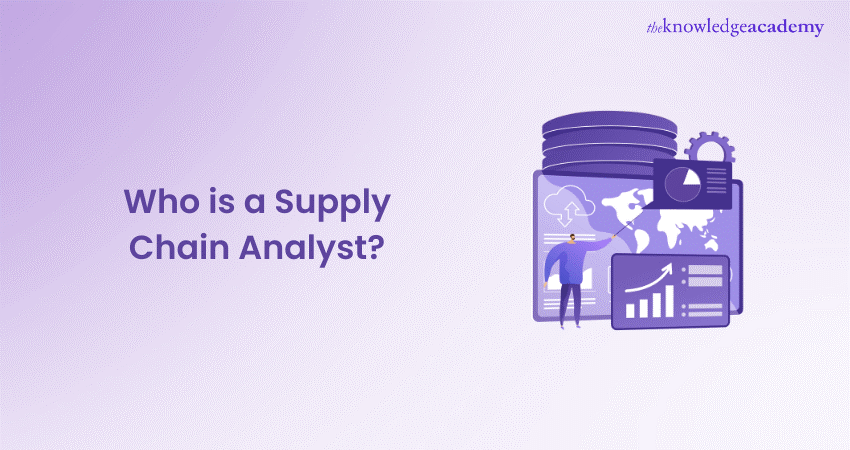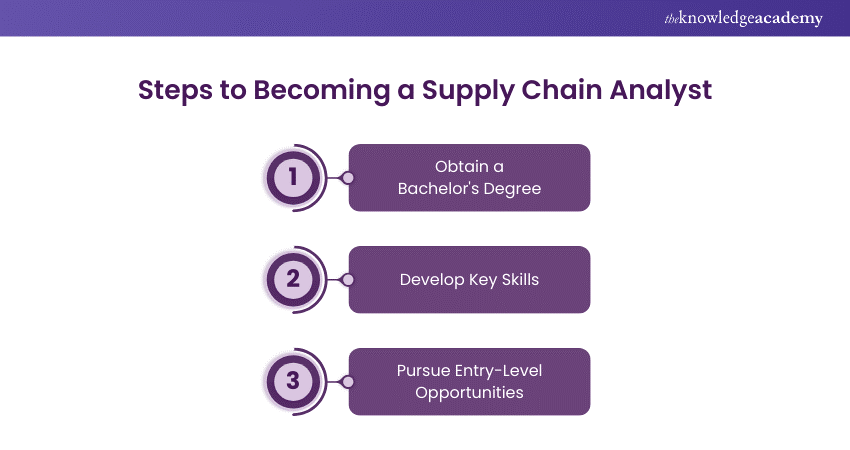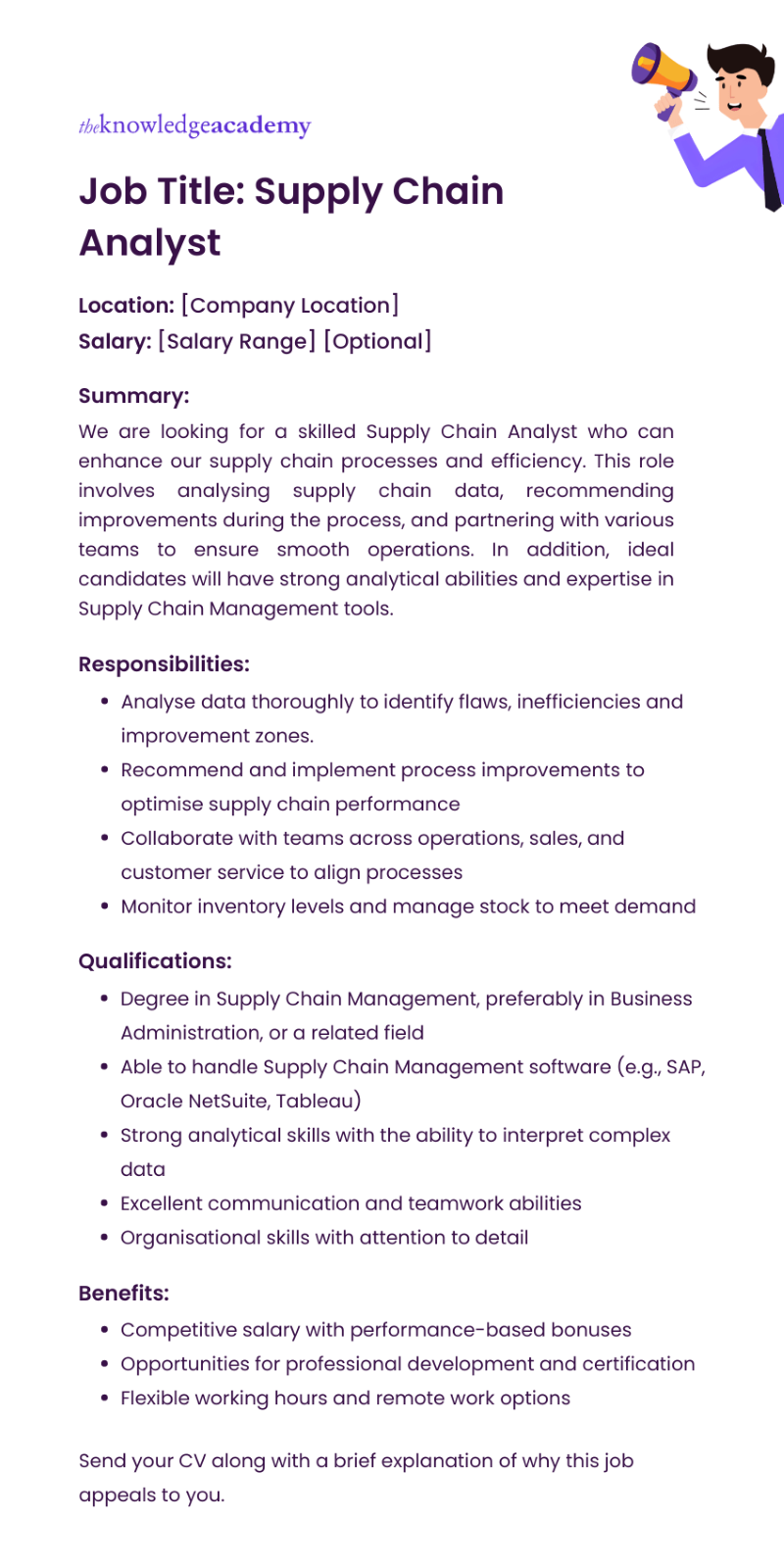We may not have the course you’re looking for. If you enquire or give us a call on 01344203999 and speak to our training experts, we may still be able to help with your training requirements.
We ensure quality, budget-alignment, and timely delivery by our expert instructors.

Have you ever wondered who is the person behind the smooth processing of products; whether it’s manufacturing or reaching customers in a secure way? The answer lies in the Supply Chain Analyst—the most sought-after professional in the logistics industry today.
As per the US Bureau of Labour Statistics (BLS), the Supply Chain Analyst position is expected to grow by 19% between 2023 and 2033, which is higher than the average of all occupations.
In this career-empowering blog, we will explore the job description for the Supply Chain Analyst, the required skills, and how you can enter this exciting industry with a wealth of opportunities waiting. Let’s dive in!
Table of Contents
1) Who is a Supply Chain Analyst?
2) Key Responsibilities of a Supply Chain Analyst
3) Essential Skills for a Supply Chain Analyst
4) Steps to Becoming a Supply Chain Analyst
5) Average Salary of a Supply Chain Analyst
6) Supply Chain Analyst Job Description
7) Conclusion
Who is a Supply Chain Analyst?
A Supply Analyst is an essential professional in an organisation who looks after the planning, analysing, and monitoring of all supply chain activities, ranging from manufacturing product completion to make sure the products are reaching the right customers post-shipping.
They typically work in Supply Chain Management-oriented industries, such as e-commerce stores that sell food, clothes, cars, electronics, furniture, pharmaceuticals, etc.
Key Responsibilities of a Supply Chain Analyst
The supply chain job responsibilities vary according to the industrial type. They are responsible for a number of functions, which include:
1) Data Analysis
Supply Chain Analysts are responsible for analysing large sets of data to identify key issues in the supply process through the applications of various specialised tools, such as SAP, Oracle NetSuite, or Tableau. This aligns with the Supply Chain Manager Role and Responsibilities, which involves addressing issues like late deliveries, insufficient warehouse space, or bad weather.
2) Recommending Process Improvements
In accordance with the issue, they derive conclusions to determine what solutions can be implemented to enhance supply chain efficiency and ensure throughput maximiser in the process.
3) Collaboration with Teams
The Supply Chain Analysts partners with diverse teams, such as sales, production, and customer service, to ensure that every process goes in a systematic order.
Master advanced procurement strategies – register now for our CIPS Level 3 Advanced Certificate In Procurement And Supply Operations.
Essential Skills for a Supply Chain Analyst
To become a proficient Supply Chain Analyst, you need to develop numerous skills. These skills are described as follows:
1) Data Analysis Expertise
They should be skilled at identifying patterns in the data and finding ways to improve the Supply Chain Management system.
2) Teamwork Abilities
The Supply Chain Analysts work in collaboration with several other team members. Therefore, they should be good at cooperating and working well with others.
3) Mathematical Proficiency
They calculate costs associated with logistics management, delivery, and Supply Relation Management (SRM). Therefore, they should be familiar with mathematics, such as cost analysis, budget forecasting, and statistical analysis.
4)Technical Competence
Supply Chain Analysts should know how to use tools like SQL, Tableau, and MS Excel to work with enormous amounts of data.
5) Organisational Skills
They should be organised and disciplined enough to handle diverse projects and tasks simultaneously without losing their patience and composure.
6) Logical Reasoning
They should be curious and capable of questioning the process to make them better and more empowering.
6) Interpersonal Skills
Supply Chain Analysts also needs to work with people outside their company, including suppliers and vendors. Hence, they should be able to listen their insights and rates patiently and building better relationships.
7) Communication Abilities
They should be able to communicate and explain ideas clearly and transparently through both writing and speaking.
8) Quantitative and Analytical Abilities
The Supply Chain Analysts should be familiar with statistical subjects and the basic numbering systems to make logical decisions and provide supervised project support.
Gain advanced procurement skills with our CIPS Level 4 Diploma In Procurement And Supply —join now!
Steps to Becoming a Supply Chain Analyst
To become a Supply Chain Analyst, it's important to follow three key steps, starting with understanding the duration of CIPS qualification to plan your career path effectively. Here's how you can go about the process.

1) Obtain a Bachelor's Degree
However, a Supply Chain Analyst won't need a bachelor's degree since it's more about tools like SAP. Still, still if you have a bachelor's degree (preferably in Business Administration), you will get the upper hand over your competitors. Moreover, by obtaining CIPS Level 6, you can easily build a strong foundation in business studies, including business laws and ethics— a crucial asset in this fast-paced profession.
2) Develop Key Skills
Develop the relevant skills thoroughly. If you feel you’re lacking in any, such as communication skills, try practising active listening at home or work.
3) Pursue Entry-Level Opportunities
After getting the necessary education and skillsets for Supply Chain Analyst, it's time to apply for the job. To do this, you must create a CV that can bypass the Application Tracking System (ATS). To do this, you must narrow down your chosen companies through sites like LinkedIn. Then, find the keywords in their job description and add them to your personalised resume.
Become a certified procurement leader with our expertly curated CIPS Level 5 Advanced Diploma In Procurement And Supply Course—register now!
Average Salary of a Supply Chain Analyst
The salaries of Supply Chain Analysts depend widely on the location, local job market, and regional inflation rates. Given below is their salary structure in the form of a table based on their experiences.
|
Experience Level |
Experience Level |
|
Entry Level (1-3 years) |
£22,000 - £35,000 |
|
Intermediate Level (3-7 years) |
£23,000 - £40,000 |
|
Senior Level (7-10+ years) |
£23,000 - £40,000 |
|
Expert Level (10+ years) |
Over £47,000 |
Ready to succeed in FinOps? Review key FinOps Interview Questions and Answers for your interview prep.
Supply Chain Analyst Job Description
The following example showcases the job description of the Supply Chain Analyst.

Conclusion
We hope you now understand about what Supply Chain Analysts is. The journey through this lucrative profession is a fore sure path to a rewarding and growing career path with plethora of opportunities in numerous industries. With the necessary skills like Data Analysis, teamwork, and technical proficiency, you will be able to succeed in this position. So, ready to embark on this fast-paced career journey with challenges and robust growth waiting?
Kickstart your career in supply operations with ours CIPS Level 2 Certificate In Procurement And Supply Operations – join now!
Frequently Asked Questions
What is the Role of Supply Chain Analytics?

The primary role of Supply chain analytics includes enhancing efficiency by analysing data in order to identify issues and improve processes. It also helps forecast demand, manage inventory, and enhance overall supply chain performance.
Which Company Pays the Highest Salary for Supply Chain Analysts?

Amazon, HSBC, and GlaxoSmithKline are the few of the companies that offer highest salaries for supply chain professionals. Top roles could often reach up to £80,000 annually.
What are the Other Resources and Offers Provided by The Knowledge Academy?

The Knowledge Academy takes global learning to new heights, offering over 3,000 online courses across 490+ locations in 190+ countries. This expansive reach ensures accessibility and convenience for learners worldwide.
Alongside our diverse Online Course Catalogue, encompassing 19 major categories, we go the extra mile by providing a plethora of free educational Online Resources like News updates, Blogs, videos, webinars, and interview questions. Tailoring learning experiences further, professionals can maximise value with customisable Course Bundles of TKA.
What is The Knowledge Pass, and How Does it Work?

The Knowledge Academy’s Knowledge Pass, a prepaid voucher, adds another layer of flexibility, allowing course bookings over a 12-month period. Join us on a journey where education knows no bounds.
What are the Related Courses and Blogs Provided by The Knowledge Academy?

The Knowledge Academy offers various CIPS Courses, including the CIPS Level 2 Certificate in Procurement and Supply Operations Course, CIPS Level 3 Advanced Certificate in Procurement and Supply Operations Course. And and CIPS Level 6 Professional Diploma in Procurement and Supply Course. These courses cater to different skill levels, providing comprehensive insights into the 15 FinOps Interview Questions and Answers.
Our Accounting and Finance Blogs cover a range of topics related to financial management, accounting principles, and investment strategies, offering valuable resources, best practices, and industry insights. Whether you are a beginner or looking to advance your financial analysis skills, The Knowledge Academy's diverse courses and informative blogs have got you covered.






 Top Rated Course
Top Rated Course




 If you wish to make any changes to your course, please
If you wish to make any changes to your course, please


